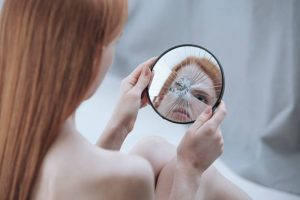5 signs of body dysmorphia
 Imagine a person named Psi looking in a mirror. They look beautiful: their skin is soft, their hair is luscious, and most importantly, they are extremely healthy. However, to Psi, they can’t help but think that their appearance is offensive to themselves and others. They put themselves down with harsh words: “ugly”, “unattractive”, and “hideous” — when in reality, this is far from the truth. This hypothetical person demonstrates cardinal characteristics of body dysmorphic disorder. Body dysmorphic disorder is a type of obsessive-compulsive disorder that focuses on the body. It is characterized by cognitive symptoms (that is, symptoms that involve the mind) such as perceived flaws in physical appearance. In this article, we’ll discuss 5 symptoms of body dysmorphic disorder. Please note that this article is for informational purposes only. Do not diagnose yourself and seek professional help if you are experiencing distress.
Imagine a person named Psi looking in a mirror. They look beautiful: their skin is soft, their hair is luscious, and most importantly, they are extremely healthy. However, to Psi, they can’t help but think that their appearance is offensive to themselves and others. They put themselves down with harsh words: “ugly”, “unattractive”, and “hideous” — when in reality, this is far from the truth. This hypothetical person demonstrates cardinal characteristics of body dysmorphic disorder. Body dysmorphic disorder is a type of obsessive-compulsive disorder that focuses on the body. It is characterized by cognitive symptoms (that is, symptoms that involve the mind) such as perceived flaws in physical appearance. In this article, we’ll discuss 5 symptoms of body dysmorphic disorder. Please note that this article is for informational purposes only. Do not diagnose yourself and seek professional help if you are experiencing distress.
1. They have frequent critical thoughts about their physical appearance when it is not noticeable by others
Psi spends countless hours telling themselves that they are “ugly” and “not good-looking”. They think that parts of their body are  deformed, even though the doctor tells them that everything looks alright. Psi’s friends also don’t notice anything wrong about their body. This example highlights the first sign of body dysmorphic disorder: an obsession about perceived flaws in physical appearance even though it is not observable to others (this can be thought of as an obsession).
deformed, even though the doctor tells them that everything looks alright. Psi’s friends also don’t notice anything wrong about their body. This example highlights the first sign of body dysmorphic disorder: an obsession about perceived flaws in physical appearance even though it is not observable to others (this can be thought of as an obsession).
2. They perform repetitive behaviours or mental acts that are caused by their frequent, critical thoughts about their physical appearance
Another sign of body dysmorphic disorder is an excessive amount of time looking into mirrors, surfaces, or cameras to check these perceived flaws. It could also be manifested by comparing their behaviour to other people in response to concerns about their body. For example, Psi may spend six hours looking at themselves in the mirror because they are worried about their appearance (this can be thought of as a compulsion).
3. Their obsessions/compulsions about their perceived body flaws cause extremely significant distress
Characteristic of many mental disorders listed in the Diagnostic and Statistical Manual for Mental Disorders is that the actions cause significant distress or impairment in many areas of life such as in school, work, and personal life. For example, Psi’s worry their body image can distract them from schoolwork, causing them to have lower grades than they are capable of

having. In addition, Psi can’t work as efficiently at their part-time job because of the intrusive, distressing thoughts. Lastly, since Psi spends up to six hours a day thinking about the obsessions and compulsions, they don’t have time to spend with their friends and family.
4. They think that other people notice and mock them for how they look
While this is not a diagnostic criteria of body dysmorphic disorder, it is common in people with the disorder. The thought that others take notice of their appearance and mock them for how they look even without any evidence is called a delusion of reference. (The truth is that many people are pre-occupied about themselves so they don’t have time to focus on others!)
5. They do not meet criteria for an eating disorder, but still place great value on their appearance
In order to be diagnosed with body dysmorphic disorder, a person cannot meet criteria for an eating disorder (e.g., anorexia, binge-eating disorder, etc.) As emphasized earlier, people with body dysmorphic disorder have perceived physical flaws (that is, they think that they look terrible when it is objectively not the case to others). Even so, they are preoccupied about their appearance; they feel as if their self-worth depends on how they look.
Perfection is an illusion
 So why is that Psi, who is 5’3″ and weighs 120 pounds see themselves as a “whale” when others see them as a healthy, beautiful individual? Because in Psi’s mind, they think that they should “look better” and that they are “imperfect”, so they should continue undergoing extreme dieting and self monitoring. The truth is, perfection is only a mere illusion.
So why is that Psi, who is 5’3″ and weighs 120 pounds see themselves as a “whale” when others see them as a healthy, beautiful individual? Because in Psi’s mind, they think that they should “look better” and that they are “imperfect”, so they should continue undergoing extreme dieting and self monitoring. The truth is, perfection is only a mere illusion.
Your goal as an individual is to stay healthy: exercise for at least 20 minutes a day, eat a proper diet (consult your doctor if you want to work on this), and surround yourself by people who lift you up and inspire you. Stop trying to chase the illusion of perfection and start taking care of yourself. Remember how Psi was looking in the mirror? Remember how they objectively looked beautiful even when they thought that they looked “ugly”? Let’s change that. Let’s start taking action to help people like Psi to start believing that they are beautiful.
Resources
https://www.cci.health.wa.gov.au/Resources/Looking-After-Yourself/Body-Dysmorphia
https://www.reddit.com/r/GetMotivated/
https://www.mind.org.uk/information-support/types-of-mental-health-problems/body-dysmorphic-disorder-bdd/useful-contacts/
Bibliography
American Psychiatric Association. (2013). Diagnostic and statistical manual of mental disorders (DSM-5®). American Psychiatric Pub.



Responses